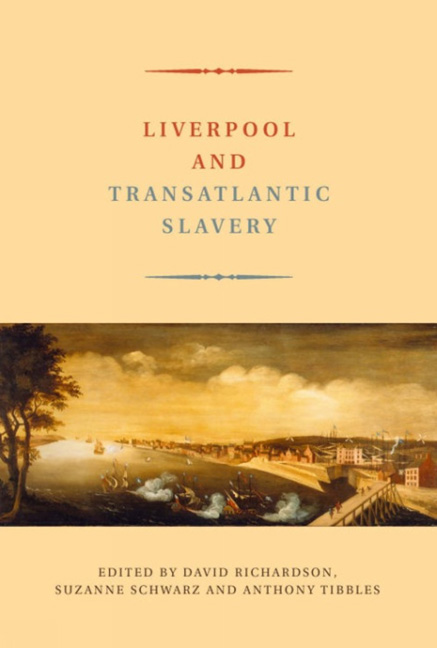Book contents
- Frontmatter
- Content
- Preface
- Notes on Contributors
- Introduction Liverpool, the African Slave Trade and Abolition Thirty Years On
- 1 Liverpool's Dominance in the British Slave Trade, 1740–1807
- 2 African Agency and the Liverpool Slave Trade
- 3 Human Capital in the British Slave Trade
- 4 Liverpool's Slave Trade to the Colonial Chesapeake: Slaving on the Periphery
- 5 The Liverpool Slave Trade, Lancaster and its Environs
- 6 The Atlantic Slave Trade and African Ethnicities in Seventeenth-Century Jamaica
- 7 The Wealth and Social Aspirations of Liverpool's Slave Merchants of the Second Half of the Eighteenth Century
- 8 ‘Cemented by the Blood of a Negro’? The Impact of the Slave Trade on Eighteenth-Century Liverpool
- 9 Commerce, Civilization and Christianity: The Development of the Sierra Leone Company
- 10 Abolitionism in Liverpool
- Index
9 - Commerce, Civilization and Christianity: The Development of the Sierra Leone Company
- Frontmatter
- Content
- Preface
- Notes on Contributors
- Introduction Liverpool, the African Slave Trade and Abolition Thirty Years On
- 1 Liverpool's Dominance in the British Slave Trade, 1740–1807
- 2 African Agency and the Liverpool Slave Trade
- 3 Human Capital in the British Slave Trade
- 4 Liverpool's Slave Trade to the Colonial Chesapeake: Slaving on the Periphery
- 5 The Liverpool Slave Trade, Lancaster and its Environs
- 6 The Atlantic Slave Trade and African Ethnicities in Seventeenth-Century Jamaica
- 7 The Wealth and Social Aspirations of Liverpool's Slave Merchants of the Second Half of the Eighteenth Century
- 8 ‘Cemented by the Blood of a Negro’? The Impact of the Slave Trade on Eighteenth-Century Liverpool
- 9 Commerce, Civilization and Christianity: The Development of the Sierra Leone Company
- 10 Abolitionism in Liverpool
- Index
Summary
Sierra Leone in the late eighteenth century exhibited the sharp confrontation of abolitionist and anti–abolitionist attitudes characteristic of metropolitan debate. The formation of a colony for freed slaves in the midst of a slave supply region on the Upper Guinea Coast of Africa was an ambitious and progressive experiment in abolitionist economics and morality. In common with Liverpool, the settlement exposed the ‘fault lines between the older slave trade and newer abolitionist mentalities’. This conflict, however, was intensified by the distinctive mix of vested interests in and around the colony. Abolitionist sympathizers were brought into direct contact with slave ship captains and indigenous and European traders on the coast, and their mutual suspicion generated conflict. The resettlement of over 1,100 self–liberated slaves in 1792 added further complexity, as they were receptive to ‘revolutionary republican ideas spreading from France and the Americas …’. The name of the principal settlement, Freetown, was a self–conscious expression of the colony's abolitionist identity, but it also reflected the desire of the former slaves to make their children ‘free and happy’.
The Sierra Leone Company, launched at a time when British participation in the slave trade was at its height and Liverpool was at the very centre of these activities, mounted a dual attack on the slave trade and plantation slavery. Throughout the period of its operation, the Company competed with slave traders on the West African coast, not only to secure cargoes of legitimate produce but to win hearts and minds and change the outlook of indigenous and European traders resident upon the coast towards the transatlantic slave system. These attempts to reform trading practices and to transfer British value systems to the West African coast form part of what Drescher has characterized as the ‘historical geography of abolitionism's confrontation with the older mentality of toleration’. As a central aim of the Company was to undermine the economic arguments deployed in defence of the trade, its policies had potentially far–reaching implications for Liverpool and other slave–trading ports. Furthermore, Company plans to persuade Africans to abandon slave–trading in favour of legitimate alternatives were being tested out in a supply area dominated by Liverpool traders.
- Type
- Chapter
- Information
- Liverpool and Transatlantic Slavery , pp. 252 - 276Publisher: Liverpool University PressPrint publication year: 2007



